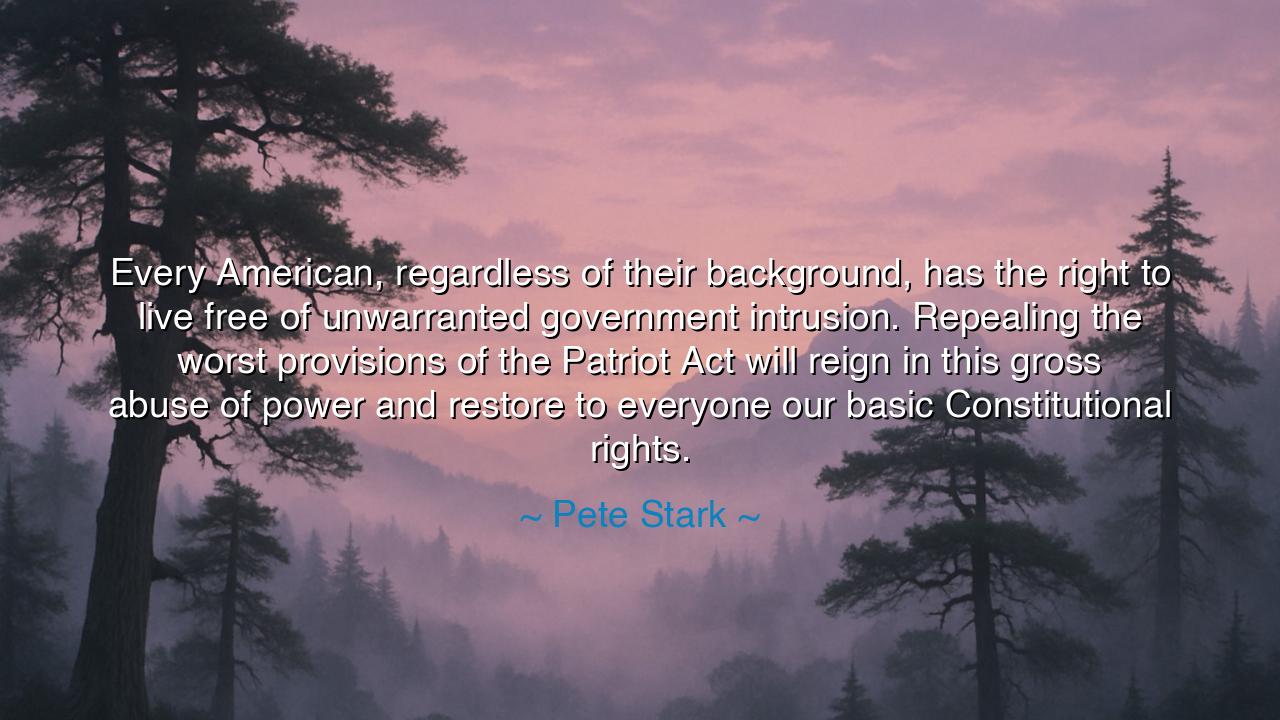
Every American, regardless of their background, has the right to
Every American, regardless of their background, has the right to live free of unwarranted government intrusion. Repealing the worst provisions of the Patriot Act will reign in this gross abuse of power and restore to everyone our basic Constitutional rights.






In a time of fear and uncertainty, when the cries of security drowned out the whispers of liberty, Pete Stark, a steadfast defender of civil rights, stood to remind his nation of its founding covenant. He declared: “Every American, regardless of their background, has the right to live free of unwarranted government intrusion. Repealing the worst provisions of the Patriot Act will rein in this gross abuse of power and restore to everyone our basic Constitutional rights.” His words, forged in the aftermath of terror, echo the voice of conscience that has guided republics through peril—the eternal struggle between freedom and fear, between the shield of security and the chains of control.
The Patriot Act, born in the shadow of the attacks of September 11, 2001, was conceived as a weapon against unseen enemies. In those desperate days, America sought safety at any cost, granting the government sweeping powers of surveillance in the name of protection. Yet over time, those powers grew heavy and unyielding, pressing upon the very citizens they were meant to defend. Pete Stark, a congressman of uncommon courage, saw the danger in this drift. For though the sword of government may defend the people, it can as easily wound them when wielded without restraint. His words remind us that liberty once surrendered is rarely returned, and that the vigilance of a free people must never rest, even against the excesses of their own leaders.
The ancients, too, knew the peril of unchecked authority. In the twilight of the Roman Republic, as enemies gathered and fear gripped the streets, the Senate granted Julius Caesar extraordinary powers to secure the state. Yet when the crisis passed, the powers remained, and the Republic fell to empire. The lesson is old as time: that freedom is most fragile not in war, but in peace—when the people grow accustomed to the watchful eyes of power and forget the taste of privacy. Stark’s warning arises from this same truth—that in trading liberty for safety, nations may gain neither, and that even the noblest law can become tyranny if not bound by principle.
His invocation of “Constitutional rights” is not a mere appeal to legality, but to the moral architecture of the nation itself. The Constitution is more than parchment; it is the living covenant between people and power. It declares that no man or woman shall live under surveillance or suspicion without cause. It binds rulers to the same laws that guard the ruled. And it rests upon a sacred assumption—that the people are not subjects to be managed, but citizens to be trusted. When government intrusion grows “unwarranted,” as Stark described, it breaks this trust, and the government ceases to be the servant of the people—it becomes their overseer.
Consider the story of Edward Snowden, who years later revealed to the world the extent of secret surveillance carried out in the name of security. His revelations stirred a nation’s conscience, awakening millions to the truth that freedom, once lost, is seldom stolen in a single night; it is eroded quietly, in whispers and approvals, under banners of protection. Stark’s call to “repeal the worst provisions” of the Patriot Act was a call to reverse that erosion—to remind a weary people that safety achieved through surrender is not safety at all, but submission.
Yet Stark’s words carry not bitterness, but hope. They speak to the enduring strength of democracy—the belief that even when liberty falters, it can be restored by the will of the people. The power that passed the Patriot Act can also undo its excesses. The same voices that once cried for vengeance can learn again to cry for justice. For as long as there are citizens willing to stand, to question, and to speak, freedom can never die—it merely sleeps until awakened by courage.
Therefore, my children of the republic, take this lesson to heart: freedom requires eternal vigilance. Do not surrender your rights to the promise of safety, for the government that watches too closely ceases to serve and begins to rule. Demand transparency from your leaders; question every law that trades privacy for protection. Remember always that the right to live free of intrusion is not a gift from the state, but the inheritance of the free. It is the birthright of all who live under the light of liberty.
And so let Pete Stark’s words endure as both warning and blessing: to guard your rights not only from foreign foes, but from fear itself. For the mightiest fortress of democracy is not the army or the law—it is the conscience of its people. Stand watch, then, not with weapons, but with wisdom; not with suspicion, but with faith in freedom. For when liberty is loved fiercely, it can never truly be lost.






AAdministratorAdministrator
Welcome, honored guests. Please leave a comment, we will respond soon